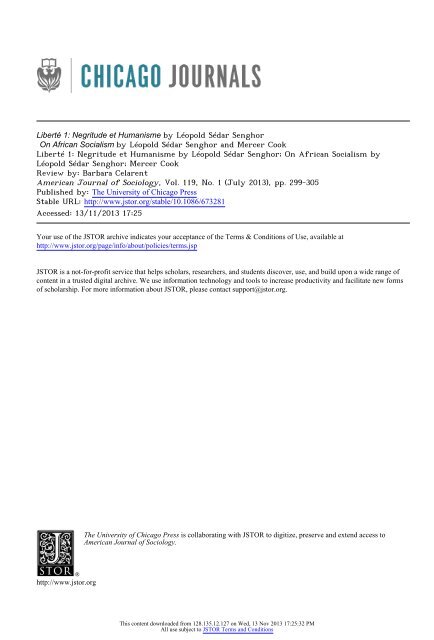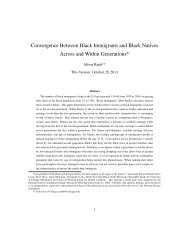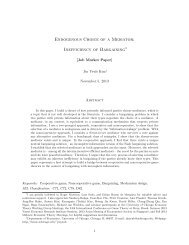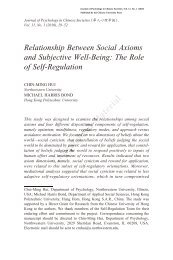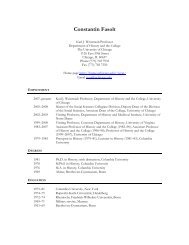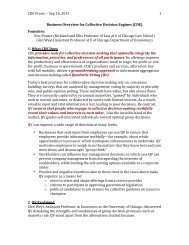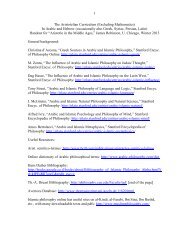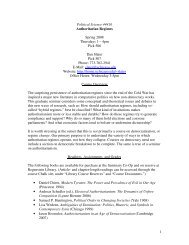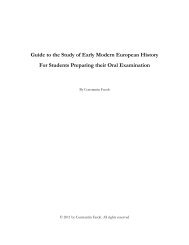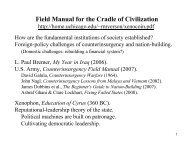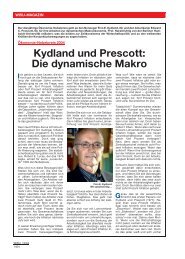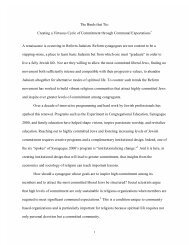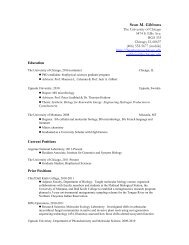Leopold Sedar Senghor Liberte 1:Negritude et Humanisme. On ...
Leopold Sedar Senghor Liberte 1:Negritude et Humanisme. On ...
Leopold Sedar Senghor Liberte 1:Negritude et Humanisme. On ...
Create successful ePaper yourself
Turn your PDF publications into a flip-book with our unique Google optimized e-Paper software.
Liberté 1: <strong>Negritude</strong> <strong>et</strong> <strong>Humanisme</strong> by Léopold Sédar <strong>Senghor</strong><br />
<strong>On</strong> African Socialism by Léopold Sédar <strong>Senghor</strong> and Mercer Cook<br />
Liberté 1: <strong>Negritude</strong> <strong>et</strong> <strong>Humanisme</strong> by Léopold Sédar <strong>Senghor</strong>; <strong>On</strong> African Socialism by<br />
Léopold Sédar <strong>Senghor</strong>; Mercer Cook<br />
Review by: Barbara Celarent<br />
American Journal of Sociology, Vol. 119, No. 1 (July 2013), pp. 299-305<br />
Published by: The University of Chicago Press<br />
Stable URL: http://www.jstor.org/stable/10.1086/673281 .<br />
Accessed: 13/11/2013 17:25<br />
Your use of the JSTOR archive indicates your acceptance of the Terms & Conditions of Use, available at .<br />
http://www.jstor.org/page/info/about/policies/terms.jsp<br />
.<br />
JSTOR is a not-for-profit service that helps scholars, researchers, and students discover, use, and build upon a wide range of<br />
content in a trusted digital archive. We use information technology and tools to increase productivity and facilitate new forms<br />
of scholarship. For more information about JSTOR, please contact support@jstor.org.<br />
.<br />
The University of Chicago Press is collaborating with JSTOR to digitize, preserve and extend access to<br />
American Journal of Sociology.<br />
http://www.jstor.org<br />
This content downloaded from 128.135.12.127 on Wed, 13 Nov 2013 17:25:32 PM<br />
All use subject to JSTOR Terms and Conditions
Book Reviews<br />
This book is a valuable addition to the debate about young women and<br />
the future of feminism. Reger’s major and unique contribution is to bring<br />
tog<strong>et</strong>her a political generations perspective, a deep knowledge of social<br />
movement studies, and attention to local community dynamics. While at<br />
times it comes across as slightly labored as every topic is worked through<br />
case study by case study, the argument about the state of contemporary<br />
feminism becomes strong, clear, and compelling chiefly because of this focus<br />
on specific activist communities. A substantive rather than style-related<br />
limitation is the choice of communities, especially given that they are in many<br />
ways so similar. It would have been extremely interesting to include feminist<br />
activist communities that were not overwhelmingly white and middle<br />
class. However, Reger makes no claims to representativeness nor generalizability<br />
and indeed she is able to unpack many challenges related to privilege<br />
as a result of her case-study choices.<br />
Reger’s argument that overlap and dialogue characterize the relationship<br />
b<strong>et</strong>ween contemporary and second wave feminisms is also an important<br />
angle in this book. While she rightly rejects categorization of feminists<br />
according to age range and uses the term “contemporary feminists” instead<br />
of “young feminists” in order to g<strong>et</strong> at overlapping generations, this nuance<br />
was not reflected in the constituencies of the activist communities ðpartly<br />
no doubt a result of having two college-based case studiesÞ. We come away<br />
with some important questions about how different political generations<br />
can and do interact and work tog<strong>et</strong>her. The book is insightful, important,<br />
and tremendously helpful for anyone seeking a rigorous, empirically<br />
grounded assessment of the state of contemporary and future feminist activism<br />
in the United States.<br />
Liberté 1: <strong>Negritude</strong> <strong>et</strong> <strong>Humanisme</strong>. By Léopold Sédar <strong>Senghor</strong>. Paris: Éditions<br />
du Seuil, 1964. Pp. 445.<br />
<strong>On</strong> African Socialism. By Léopold Sédar <strong>Senghor</strong>. Translated by Mercer<br />
Cook. New York: Praeger, 1964. Pp. 173.<br />
Barbara Celarent *<br />
University of Atlantis<br />
Although he became an internationally famous political leader, throughout<br />
his life Léopold Sédar <strong>Senghor</strong> remained an intellectual. His po<strong>et</strong>ry is<br />
enshrined as classic. His incidental writings make up five thick volumes of<br />
elegant prose. His concept of “negritude” remains a vibrant challenge to the<br />
many vari<strong>et</strong>ies of racism. If politics did not leave <strong>Senghor</strong> the time to transform<br />
all of this insight into a systematic analysis of soci<strong>et</strong>y, it non<strong>et</strong>heless<br />
provided him with a breadth of experience and a depth of understanding<br />
* Another review from 2052 to share with AJS readers.—Ed.<br />
299<br />
This content downloaded from 128.135.12.127 on Wed, 13 Nov 2013 17:25:32 PM<br />
All use subject to JSTOR Terms and Conditions
American Journal of Sociology<br />
unavailable to the writers of systematic treatises. And in the modern culture<br />
of superficial summaries, <strong>Senghor</strong>’s writings stand out for their combination<br />
of brevity with precision, of accessibility with grace. They say much in little<br />
space, and their consistency is the consistency of the man himself, always<br />
changing over the course of a long and eventful life, y<strong>et</strong> always remaining<br />
the same.<br />
Léopold Sédar <strong>Senghor</strong> was born in the coastal town of Joal, Senegal,<br />
but grew up in his mother’s inland village of Djilor, his mother having refused<br />
to join her husband’s other wives in the elder <strong>Senghor</strong>’s compound in<br />
Joal. <strong>Senghor</strong>’s father was a hunter-turned-merchant, brokering the rural<br />
peanut trade for a French firm and practicing a loose Catholicism despite<br />
his polygamy. The family hybridity was evident in <strong>Senghor</strong>’s name, the Catholic<br />
“Léopold” being added to the Serer “Sédar.” For seven years, <strong>Senghor</strong><br />
grew up in the rural countryside, dreamy and thoughtful. His father then<br />
called him to Joal and sent him to school. Although <strong>Senghor</strong> himself felt<br />
a vocation for the priesthood, a combination of French assimilationism, astounding<br />
talent, and amazing luck took <strong>Senghor</strong> through various schools<br />
to the top of the French educational system. In 1928, at age 21, he arrived<br />
at the Lycée Louis-le-Grand to prepare for the exams to enter the École<br />
Normale Supérieure, the alma mater of six prime ministers, as well as of<br />
Henri Bergson and Jean-Paul Sartre, of Louis Pasteur and Émile Durkheim.<br />
Among <strong>Senghor</strong>’s close friends at Louis-le-Grand was classmate Georges<br />
Pompidou, who introduced the reclusive <strong>Senghor</strong> to the broader social and<br />
intellectual Parisian world and who would be prime minister and then president<br />
of France from 1962 to 1974 when <strong>Senghor</strong> was president of Senegal.<br />
Choosing not to r<strong>et</strong>ake the École Normale exam after his first failure (Durkheim,<br />
for example, passed only on his third try), <strong>Senghor</strong> took a university<br />
degree and began teaching in Tours, meanwhile pursuing studies in <strong>et</strong>hnography<br />
and linguistics with an eye to a university post. At the same time,<br />
he began writing po<strong>et</strong>ry and, with Aime Césaire and Leon Damas, built the<br />
negritude movement. In the mid-1930s, he became agrégé of the University<br />
of Paris, the first African to do so, and in the late 1930s, he gradually<br />
emerged as an important political spokesman for French West Africa.<br />
The French assimilationist ideal included military service, and during<br />
the war, <strong>Senghor</strong> was captured and spent 18 months in a POW camp. There<br />
he wrote what would become his second main collection of po<strong>et</strong>ry (Hosties<br />
noirs) and rediscovered his African roots directly, since German policies segregated<br />
prisoners by race. After the war, <strong>Senghor</strong> decided to enter politics,<br />
becoming an elected deputy to the French Assembly under the tutelage of<br />
Lamine Guèye, then Senegal’s leading politician. Although both men affiliated<br />
with the French socialist party, <strong>Senghor</strong> found European socialism irrelevant<br />
to the African situation and broke with both the party and Guèye.<br />
He built his own political organization, based on the rural masses and, in<br />
predominantly Muslim northern Senegal, on the marabouts, the traditional<br />
religious leaders. He was aided in this task by the brilliant Muslim schoolteacher<br />
and rural organizer, Mamadou Dia (toleration was characteristic<br />
300<br />
This content downloaded from 128.135.12.127 on Wed, 13 Nov 2013 17:25:32 PM<br />
All use subject to JSTOR Terms and Conditions
Book Reviews<br />
of both <strong>Senghor</strong> and Senegal). As a result, <strong>Senghor</strong>’s party dominated Senegalese<br />
politics in the years leading up to independence in 1960, and <strong>Senghor</strong><br />
emerged in this period as one of the two most important politicians of<br />
West Africa, alongside the more radical Félix Houphou<strong>et</strong>-Boigny of Côte<br />
d’Ivoire.<br />
In 1960, <strong>Senghor</strong> became independent Senegal’s first president, a position<br />
he held until 1980. Throughout all this time, he continued to write po<strong>et</strong>ry,<br />
to produce elaborate and learned political analyses, and to participate actively<br />
in literary and intellectual life. But his popularity waned during his<br />
presidency. In part this reflected his break with Dia in 1962. More important,<br />
the inevitable problems of development in a country with few natural<br />
resources led to public disillusionment, although the post-<strong>Senghor</strong> years<br />
produced a certain nostalgia as well. <strong>Senghor</strong> was one of the few African<br />
leaders of his time to give up power voluntarily, continuing a Senegalese<br />
tradition of democracy that extended well before independence. <strong>Senghor</strong>’s<br />
r<strong>et</strong>irement held further surprises, however. In 1984 he was elected to the<br />
Académie Française. His writing continued unabated, and his po<strong>et</strong>ry became<br />
established in the French canon. He died in France in 2001.<br />
<strong>Senghor</strong>’s published work takes two forms. First are the po<strong>et</strong>ry collections,<br />
which appeared in 1945, 1948, 1956, 1961, 1964, 1969, and 1979. They<br />
constitute a sustained examination of <strong>Senghor</strong>’s life, from the first po<strong>et</strong>ic<br />
memories of Africa, written in the gray winter of Paris, to the elegy for his<br />
son Philippe, who died in an automobile accident when <strong>Senghor</strong> was 76.<br />
<strong>Senghor</strong>’s po<strong>et</strong>ic gift was lyrical and self-consciously African. His po<strong>et</strong>ry is<br />
pervaded by rep<strong>et</strong>ition, rhythm, and assonance—devices he identified as<br />
central to negritude, the black experience of the natural and social worlds.<br />
Likewise, his choice of the lyric genre paralleled his identification of negritude<br />
with direct sensual experience and a “surreal” connection to the<br />
world (for <strong>Senghor</strong>, “surreal” meant “beyond the real” or “more than real”).<br />
Indeed, <strong>Senghor</strong> once remarked that a black man always possessed a lyrical<br />
sensibility [Liberté 1, p. 66]). Although <strong>Senghor</strong> was both an adept<br />
practitioner as well as an admirer of the abstract thinking that he found<br />
in Europe, he contrasted European abstraction throughout his life with<br />
the lyrical and direct mode of experience for which Africa was both his<br />
personal source and—in the abstract, European sense—his symbol. It is<br />
the merit of thinking in po<strong>et</strong>ry that <strong>Senghor</strong> could always sustain this ambivalence<br />
b<strong>et</strong>ween abstraction and concr<strong>et</strong>eness, where the pressures of consistency<br />
and discipline would have forced a writer of treatises to choose the<br />
one or the other.<br />
This persistent ambivalence also pervades the second form of <strong>Senghor</strong>’s<br />
work, the collections of other writings that form the five volumes of Liberté.<br />
Here are contained speeches, lectures, introductions and prefaces, reviews,<br />
essays, reports: all the prose <strong>Senghor</strong> generated in a long intellectual life.<br />
The volumes are loosely organized by topic, but since they appeared in 1964,<br />
1971, 1977, 1983, and 1993, they are also inevitably chronological. Liberté 1,<br />
reviewed here, contains two prewar pieces, but the majority of its contents<br />
301<br />
This content downloaded from 128.135.12.127 on Wed, 13 Nov 2013 17:25:32 PM<br />
All use subject to JSTOR Terms and Conditions
American Journal of Sociology<br />
date from 1950 to 1964, the years of <strong>Senghor</strong>’s rise to political eminence.<br />
The book contains everything from <strong>Senghor</strong>’s first major public lecture in<br />
Dakar (1937) to essays on Senegalese po<strong>et</strong>s and folklore, from analyses of<br />
the Harlem Renaissance to discussions of 16th-century French po<strong>et</strong>ry, from<br />
essays on linguistics to elegies of famous Senegalese. (<strong>Senghor</strong>’s essay on reading<br />
Go<strong>et</strong>he in his prisoner-of-war camp is very moving.)<br />
That the longest of the 58 pieces in this book is 35 pages makes clear at<br />
once that <strong>Senghor</strong> the social and cultural theorist writes in the same form<br />
as does <strong>Senghor</strong> the po<strong>et</strong>. He does not make a long and systematic argument.<br />
He writes in short pieces that we might call theor<strong>et</strong>ical lyrics. In these<br />
are deployed, again and again, the basic terms of <strong>Senghor</strong>ian thought: negritude,<br />
surreality, integral humanism, sense and symbol, civilization and<br />
culture, rhythm, image, and the civilization of the universal. Indeed, the longer<br />
pieces of <strong>Senghor</strong> reveal themselves, on inspection, to be linked chains<br />
of smaller theor<strong>et</strong>ical insights. In keeping with the lyrical—as opposed to<br />
narrative—tendency of <strong>Senghor</strong>’s thought, there is no long logical thread<br />
of theor<strong>et</strong>ical argument, but rather a d<strong>et</strong>ailed sense of the central realities of<br />
a present, expressed again and again, in various s<strong>et</strong>tings and with various<br />
materials. And most important are the realities that black African culture<br />
has som<strong>et</strong>hing profoundly important to offer to European culture, that this<br />
som<strong>et</strong>hing has been lost in Europe itself, and that a universal civilization<br />
cannot lose any major part of the human project. (For readers who prefer<br />
traditional exposition of theory, the essay “Eléments constitutifs d’une civilisation<br />
d’inspiration négro-africaine” [Liberté 1, pp. 252–86] is as close<br />
as <strong>Senghor</strong> g<strong>et</strong>s to a systematic presentation of the underpinnings of negritude.)<br />
The three longer essays contained in the translated volume <strong>On</strong> African<br />
Socialism date from the period of <strong>Senghor</strong>’s political triumph, and one<br />
finds in them a much more practical approach. Here <strong>Senghor</strong> the politician<br />
is demonstrating that classical Marxism is irrelevant to Africa, but that a<br />
renewed socialism, rooted in African culture, can provide Senegal with a<br />
way forward. These essays present <strong>Senghor</strong> the pedagogue, working his way<br />
through the d<strong>et</strong>ails of Marx and then onward to the contemporary French<br />
Marxists like Lucien Goldmann and Henri Lefebvre. He is concerned that<br />
his listeners g<strong>et</strong> the definitions right, but also that they follow him in his rereading<br />
of Marx as a humanist who got lost in the d<strong>et</strong>ails of economic materialism.<br />
(<strong>Senghor</strong> very much preferred the earlier, more philosophical and<br />
abstract Marx to the later and more historically localized one.) He wants his<br />
hearers not to reject the Negro-African heritage for a Europeanized materialism,<br />
for Marx’s “terribly inhuman m<strong>et</strong>aphysics, an atheistic m<strong>et</strong>aphysics<br />
in which mind is sacrificed to matter, freedom to the d<strong>et</strong>ermined, man<br />
to things” (African Socialism, p. 76). Y<strong>et</strong> these essays are also filled with<br />
specific political and social recommendations, as befits their origin as lectures<br />
to party audiences in Senegal. <strong>On</strong>e can only guess what the young Senegalese<br />
cadres must have made of <strong>Senghor</strong>’s extended elaboration of the<br />
302<br />
This content downloaded from 128.135.12.127 on Wed, 13 Nov 2013 17:25:32 PM<br />
All use subject to JSTOR Terms and Conditions
Book Reviews<br />
ideas of Teilhard de Chardin, whose writings became central to him after<br />
the mid-1950s.<br />
<strong>Senghor</strong>’s ideas changed slowly but steadily over the course of his life,<br />
since both his habits of thought and his immediate political needs drove<br />
him to focus on present matters. <strong>On</strong>e sees this first of all in his sources. The<br />
early works employ the writings of Leo Frobenius and other European <strong>et</strong>hnographers<br />
to undermine racist descriptions of black “primitivism,” whereas<br />
the later ones engage directly with Marxism as a flawed account of presentday<br />
Africa. The early works derive their tolerant humanism in part from<br />
the attempt of Jacques Maritain (in <strong>Humanisme</strong> Intégral, 1936) to envision<br />
a world soci<strong>et</strong>y in which Catholicism would be but one of several religions,<br />
where the later ones rely heavily on the progressivist evolutionism and scientized<br />
moralism of Pierre Teilhard de Chardin. (It is striking that both writers<br />
were considered dangerous by the Catholic church, to which <strong>Senghor</strong><br />
remained dedicated throughout his life: Maritain’s book was nearly placed<br />
on the Index, and Teilhard de Chardin’s major work was suppressed during<br />
his lif<strong>et</strong>ime by the general of the Jesuit order to which he belonged.)<br />
But the change in <strong>Senghor</strong> involves not only sources, but also ideas. <strong>Senghor</strong>’s<br />
earliest pieces make much of métissage—hybridization. He saw métissage<br />
everywhere—in his father’s combination of native beliefs with Catholicism,<br />
in the Senegalese racial mixture of Berbers and sub-Saharan<br />
Africans, in his own combination of French and Senegalese experience. But<br />
hybridization eventually staled for <strong>Senghor</strong> the politician and writer, however<br />
much it may have described <strong>Senghor</strong> the man. His later work argues<br />
the need for a different African way, less a hybridizing of Western and African<br />
ideas and more a newly envisioned form of socialism, rooted in what <strong>Senghor</strong><br />
took to be the traditional soci<strong>et</strong>y of Africans. The judicious professor,<br />
standing above the fray, had to take sides when he became a politican and<br />
president.<br />
It has been common to belittle <strong>Senghor</strong>’s social theory as having mistaken<br />
the distinction of traditional and modern soci<strong>et</strong>ies for the distinction—correlated<br />
with the first in <strong>Senghor</strong>’s experience—of black and white<br />
soci<strong>et</strong>ies. This is false in two crucial respects. First, <strong>Senghor</strong> was well aware<br />
that not all nonmodern soci<strong>et</strong>ies were black, as one notes from his scattered<br />
remarks about China, the Arab Middle East, North Africa, and India. To<br />
be sure, he never evinces the broadly historical consciousness that typically<br />
sustains a narrative sensibility’s concept of the universal. But that was not<br />
his way. He seeks the universal realities of the colonial encounter through a<br />
profound mastery of his own case, as the lyrical sensibility requires.<br />
But more important, <strong>Senghor</strong> does not think that the virtues of negritude<br />
are either absent from or indeed optional in modern life. Quite the contrary,<br />
for him negritude embodies the direct experiencing of the world that<br />
must be recovered if humanity is to advance. So he identifies the key signs<br />
of negritude in Western writers as diverse as Louise Labé, Victor Hugo, and<br />
even J. W. Go<strong>et</strong>he. Philosophical movements like existentialism and phenom-<br />
303<br />
This content downloaded from 128.135.12.127 on Wed, 13 Nov 2013 17:25:32 PM<br />
All use subject to JSTOR Terms and Conditions
American Journal of Sociology<br />
enology were clearly, for <strong>Senghor</strong>, merely more evidence of this fact, and so<br />
we find him citing writers like Jean Piag<strong>et</strong> and Maurice Merleau-Ponty.<br />
<strong>Negritude</strong> was thus for <strong>Senghor</strong> not by any means unique to Africans.<br />
As he said when discussing the reverse case, of wh<strong>et</strong>her Negro Africans had<br />
the European virtue of discursive abstraction:<br />
Does this mean, as certain young people would like to interpr<strong>et</strong> my remarks,<br />
that the Negro African lacks discursive reason, that he has never used any? I<br />
have never said so. In truth every <strong>et</strong>hnic group possesses different aspects of<br />
reason and all the virtues of man, but each has stressed only one aspect of<br />
reason, only certain virtues. (African Socialism, p. 75)<br />
Thus, negritude was for <strong>Senghor</strong> a universal attribute which Negro Africans<br />
had developed to a particularly high degree:<br />
L<strong>et</strong> us then consider the Negro African as he faces the object to be known,<br />
as he faces the Other: God, man, animal, tree or pebble, natural or social phenomenon.<br />
In contrast to the classic European, the Negro African does not draw a<br />
line b<strong>et</strong>ween himself and the object, nor does he merely look at it and analyze<br />
it. ... Immediately, he is moved, going centrifugally from subject to object on<br />
the waves of the Other. ... .Thus the Negro African [literally] sympathizes,<br />
abandons his personality to become identified with the Other, dies to be reborn<br />
in the Other. He does not assimilate. He is assimilated. ... Subject and object<br />
are face to face in the very act of knowledge. It is a long caress of the night,<br />
an embrace of joined bodies, the act of love. (African Socialism, p. 73)<br />
For <strong>Senghor</strong>, there was a long list of European versions of this immediate<br />
perception of, this identification with, the Other. But they had been lost.<br />
An increasing awareness of them was what black Africa could give back to<br />
Europe.<br />
As the first of these passages proleptically suggests, <strong>Senghor</strong>’s ideas have<br />
been widely caricatured. His insistence on the centrality of rhythm and emotion<br />
in negritude have been turned by a sound-bite culture into trivial beliefs.<br />
But in fact, <strong>Senghor</strong>’s concept of rhythm is extremely complex, having been<br />
strongly influenced by his linguistic studies of the formal vari<strong>et</strong>ies of rhythm<br />
in Wolof and Serer po<strong>et</strong>ry and folktales. Or again, his concept of emotion is<br />
not the simple one usually attributed to him, but a complex theory of unmediated,<br />
direct experience of the sensual world by assimilating oneself to it and<br />
searching for the sens behind the surface, wh<strong>et</strong>her of reality or symbol. (The<br />
word sens in French can mean “meaning,”“intuition,” and “sensation.” Most<br />
often, <strong>Senghor</strong> intends all three.)<br />
<strong>Senghor</strong>’s theories therefore make an important contribution to our conceptualization<br />
of personal and social experience. The direct attachment of<br />
them to racial difference may not survive, to be sure, although the notion<br />
that there are soci<strong>et</strong>ies that particularly value unmediated experience is an<br />
interesting and possible one. But the depth <strong>Senghor</strong>’s theor<strong>et</strong>ical contribution<br />
itself is unquestioned, even though that contribution came not through<br />
a systematic treatise but through a flexible s<strong>et</strong> of concepts and ideas deployed<br />
again and again throughout his writing.<br />
304<br />
This content downloaded from 128.135.12.127 on Wed, 13 Nov 2013 17:25:32 PM<br />
All use subject to JSTOR Terms and Conditions
Book Reviews<br />
The historical facts matter, too. It is important that a black African confronted<br />
the entire edifice of then-current Western theory about race, accepted<br />
it more or less on its own terms (with some modifications by paleontologists<br />
like Teilhard), and then found a way to turn it on its head: <strong>Senghor</strong> used<br />
Western knowledge itself to say African experience represented som<strong>et</strong>hing<br />
every bit as important as European experience. That this feat later came<br />
to seem pointless because those old theories of race were pushed aside in<br />
favor of newer theories does not lessen <strong>Senghor</strong>’s achievement. Reinterpr<strong>et</strong>ing<br />
European ideas in the light of African experience, he found som<strong>et</strong>hing<br />
essential that black Africa could contribute to a French civilization<br />
wallowing in military defeat, imperial decline, and materialist emptiness.<br />
If there is a question that remains after reading <strong>Senghor</strong>, it is what he<br />
actually meant by “Civilization of the Universal,” a phrase that comes from<br />
Teilhard. <strong>Senghor</strong> made much of Teilhard’s insistence that unity alone permits<br />
differentiation and that difference is complementary, not hierarchical.<br />
Y<strong>et</strong> the unity <strong>Senghor</strong> saw in Africa fell victim to a hundred particularisms.<br />
His projected West African federation foundered at Independence.<br />
His political coalition cracked within two years of his presidency. The ideal<br />
Africa of his memory/theory disolved under the pressures of dependent<br />
development. (If one peruses the later volumes of Liberté, one finds him in<br />
1975 paraphrasing Go<strong>et</strong>he somewhat mournfully, saying “everyone should<br />
be hybrid [métis] inhisownway” [Liberté 5, p. 51]). As a practicing politician<br />
<strong>Senghor</strong> changed with his times, but like all politicians he could not<br />
change fast enough nor escape the prices he had paid for power. For all their<br />
size and authority, social structures change much faster than men, and the<br />
ideologies that made <strong>Senghor</strong> an ideal leader for peaceful independence<br />
did not serve as well in a nation suddenly on its own and challenged by internal<br />
differences that had been hidden by the fact of a commonly suffered<br />
imperialism. In the active world, there can be no man for all seasons.<br />
But what <strong>Senghor</strong> bequeathed us as social scientists is not his political<br />
heritage, but a body of social thought unlike any other. For he addressed one<br />
of the great questions of his century—the question of race—through the<br />
unusual perspective of a lyrical sensibility. He wrote his ideas in poems. He<br />
elaborated them across dozens of occasional pieces. He avoided consistency<br />
of argument for consistency of sens. For it is the consistency of his immediate<br />
sensibility as a thinker that one encounters when reading <strong>Senghor</strong>. Not<br />
an argument summarizable in short statements or an example of this or<br />
that position. Instead, one encounters a unique man with a unique perspective<br />
compounded of unique experience. He has the gift to tell his thoughts<br />
in page after page of beautiful prose and po<strong>et</strong>ry. There is only one Sédar<br />
<strong>Senghor</strong>.<br />
305<br />
This content downloaded from 128.135.12.127 on Wed, 13 Nov 2013 17:25:32 PM<br />
All use subject to JSTOR Terms and Conditions


